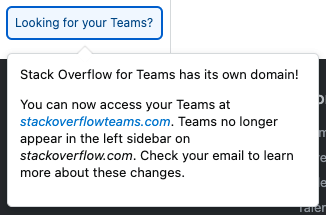How’s business at Stack Overflow?
I’m writing today to share that I’ve made the very difficult decision to reduce our workforce by about 10%, or 58 employees.—Prashanth Chandrasekar, CEO Stack Overflow
Well, that makes the question in the title easy. Business isn’t great if you are cutting 10% of your workforce just 2 years after being acquired for $1.8 billion (with a “B”). Layoffs are what happens when a business unit is spending money like it’s going out of style and needs to reign it in a bit.
A month or so before the Stack Overflow sale was announced, I predicted investors were looking for the exit. I concluded they had an offer from Microsoft that wasn’t large enough for their ambitions and that their only remaining option was to go public. My estimate was that investors were looking for a valuation in the range of half a billion dollars.
I didn’t anticipate a South African company flush with cash from an investment in a Chinese stock spinning off a Dutch subsidiary eager to add Stack Overflow to their edtech business. I described this complicated turn of events in a Twitter thread.1 Right around that point I also realized I left out a major piece of the evaluation puzzle: I hadn’t counted the portion of the company that was tied up in options2 and unissued shares. After making a few adjustments to my model, I concluded that $1.8 billion was too expensive, but not outrageously expensive, for Stack Overflow.
I also had a bit of inside knowledge to go on. I knew, for instance, that Stack Overflow had three lines of business:
- An advertising business.
- A job board business labeled “Talent”.
- A Teams service that grew out of Stack Overflow Enterprise.
Advertising revenue rises and falls with traffic (more or less) and I estimate from anonymous feedback that traffic has held steady even as participation has fallen off since 2016-7. The nice thing about advertising is that it’s pretty high margin if you are getting content for free. If you set up programmatic ads, such as Google AdSense, you don’t even need to have a sales team. Not a lot of growth potential perhaps, but predictably profitable.
Stack Overflow’s job board business was discontinued last year. There’s still a Talent landing page, but it seems to be focused on branding and advertising for companies that are hiring. From what I can tell, the job board was a viable business, but it didn’t have hyper-growth potential and it required a specialized sales team. It also doesn’t fit neatly into the education technology story the new owners were telling their investors.
Talent was a large portion of the company’s revenue just a few years before the sale. For a while it was over half and perhaps as much as ⅔ of Stack Overflow’s revenue. Some of that revenue was subscription-based and, if I understand correctly, could have been collected perpetually if the service hadn’t been scrapped. Big technology companies subscribed to Talent in order to augment other recruiting sources. Talent also supported a quirky timeline feature that I found rather useful for tracking my career, which is a small loss in the big picture.
I initially wondered if discontinuing Talent was eyewash for potential investors. Startups are supposed to be high-growth, high-margin or both. Job listings have lots of competition and fluctuate as the hiring market fluctuates. But since it was finally canceled well after the acquisition, I suspect it was no longer growing and, perhaps, unprofitable. I don’t get the feeling that the new CEO was interested in this line of business and it could be that Talent was starved of resources until it was easy to eliminate.
Finally, there’s Teams, which is just the sort of high growth, high margin and high lock-in business startup companies love to stumble into. And boy howdy did Stack Overflow do its best to avoid building this product. For years there was an Enterprise version of Stack Overflow that large companies could host internally. We told smaller companies not to bother and to use an alternative Q&A. But thanks to a couple of internal advocates,3 the idea was explored and finally became the centerpiece of the Stack Overflow business.
Here’s was Prosus says about Stack Overflow in their most recent financial statement:
Stack Overflow, a leading knowledge-sharing platform, now serves around 100 million people worldwide every month. The community site continues to add an average 200 000 new registrations every month. Stack Overflow grew total bookings by 53% in the period. The business grew revenue in local currency, excluding M&A, by 33% to US$45m, driven by growth in Stack Overflow for Teams, which enables organisations to build their own internal communities on top of the open platform. Stack Overflow for Teams contributed 49% of total revenues. By September 2022, Stack Overflow had 1 262 paying teams generating annual recurring revenue of US$50m, a growth of 66% over the prior period. Increased investment in engineering and product-development initiatives, sales headcount and marketing programme expenses, mainly in Stack Overflow for Teams, contributed to the trading loss of US$42m, a margin expansion of 18 percentage points to 93%.
I’m not 100% sure what that last sentence means, but I think Stack Overflow got $45 million in revenue and (after subtracting expenses) lost $42 million. Since 42/45 = .933…, I suppose that’s what they mean by “a margin expansion of 18 percentage points to 93%.” That’s an odd way to put it though. Margin normally tells you how much each dollar in sales is retained as earnings. But in this case, Stack Overflow spent almost twice as much as it brought in. I could be reading this wrong, but mathematically it probably should be -93%.4
I guess the bigger point is that Teams has nearly equaled Advertising as a revenue source. (“Stack Overflow for Teams contributed 49% of total revenues.”) Remember Advertising probably hasn’t grown very much and Talent isn’t a thing anymore. So Teams has certainly grown a lot since it started, but probably not enough to justify $1.8 billion. Again, I’m pretty sure Prosus overpaid.
They might not have understood, exactly, what they were buying. Last fall, Stack Overflow for Teams moved off of Stack Overflow. This is what I see as the owner of a Team:

Stack Overflow has good reasons for making this change:
Since the beginning users were worried about accidentally posting on the public site when they thought they were in the comfort of their own team. By making a Teams separate from public Stack Overflow, it’s easier to sell new customers on the idea that Teams isn’t a security risk.
Having a separate domain means engineers can work on Teams without worrying about breaking the public site and vice versa.
I can imagine members of the SRE and sales teams casually chatting about their frustrations with Teams and discovering they both needed the same solution to their problems. It makes a lot of sense! It’s also a good way to kill Stack Overflow for Teams.5
A few years ago Elon Musk suggested that cities should build tunnels to solve the traffic problems in big cities. So people on Twitter made fun of him for discovering subways. Of course the idea wasn’t exactly the same as a subway since people would stay in their cars rather than walk to the train. Still, underground tunnels for cars face many of the same challenges as underground tunnels for trains plus a few extra potential problems. Well Stack Overflow for Teams discovered Stack Overflow Enterprise. Moving off of stackoverflow.com removed the one compelling feature Teams has.
This might sound like hyperbole, but I’ve used a lot of internal knowledge systems. None of them other than Stack Overflow for Teams work. Teams isn’t a slam dunk either, but for programmers it had the huge, enormous, incalculable advantage of living right on the page that they probably have open in one (or likely more) of their tabs. It removes one source of friction between using the tool and forgetting it exists.
The tools of remote work are chat, video calls and shared documents. Teams needs to be easier to use than shared documents. If you are using Google or Microsoft, there is already a large ecosystem supporting sharing documents of all sorts. You already have an account and so do all of your co-workers. When someone shares a document in chat, it shows up with a preview. All the documents you have access to are searchable. Everybody knows how to use shared documents.
Teams lacks any advantage unless one or two people are already using Stack Overflow. Stack Overflow has been optimized for sharing technical knowledge. Take one seemingly trivial thing: code blocks. Sharing code is fundamental to technical documentation, but Word and Google Docs don’t have an easy way to mark code as separate from prose. I generally use a combination of indenting the Courier New font to set code. It works, but I always wish we could use Markdown for that.6 Unless you have people dedicated to using Stack Overflow, your team will fall back to the easiest path: shared documents.
Look. I might be exaggerating the impact of moving Teams off of Stack Overflow. I don’t have the data that Stack Overflow has and maybe Slack, GitHub, Jira, and (Microsoft) Teams integrations do the trick. What I do know is that if I were selecting a knowledge sharing system for developers, I wouldn’t pick Stack Overflow for Teams. I’d just use GitHub. It’s hard to find a system that’s closer at hand to coders than source control. For non-technical teams, I stick with Google docs as the path of least resistance.
It’s odd to me that the layoffs were 10% across the board. It comes right out of the Jack Welch playbook. He was the CEO of GE and asserted that 20% of a workforce is particularly productive, 70% are just fine and 10% aren’t producing and should be fired. Unless things have radically changed, Stack Overflow doesn’t use stack ranking. But across-the-board layoffs force managers to cut people who probably ought to be retained. Back in 2017 a 20% layoff resulted in significant losses of talent that needed to be replaced a few years later when the business turned around.
There’s also the issue of Stack Overflow’s CEO chasing the newest shiny object. I gotta say I’m not particularly optimistic about the venture, but I’m open to being wrong.
I mention in that thread that I’d invested in Naspers, the South African company that owns (and is also somehow owned by) Prosus. I’ve lost 26% on my investment,which isn’t really the fault of Stack Overflow, per se.↩︎
Especially strange since I still held options in Stack Overflow that were bought a few months later for one of my better investments.↩︎
Michele Keiper (Director of Customer Success & Support, Stack Overflow) and Mark Birch (Enterprise Sales Executive). They shouldn’t be footnotes in this story, but I don’t have much public to point to. There might have been others who advocated for this idea that I don’t know about.↩︎
The previous year it made $54 million and lost $34 million. That doesn’t square with growth or improvement in margin. I’m likely misunderstanding something, but I do know that trading losses aren’t trading profits.↩︎
I’m going to link to Steve Yegge’s platform rant, but I won’t go into detail about how it applies. I have a whole ’nother post about it that I might or might not finish.↩︎
Markdown is used anywhere programmers have had a say in design: Stack Overflow (natch), GitHub, Discourse and Discord. Even Slack and Microsoft Teams support subsets of Markdown formatting.↩︎
